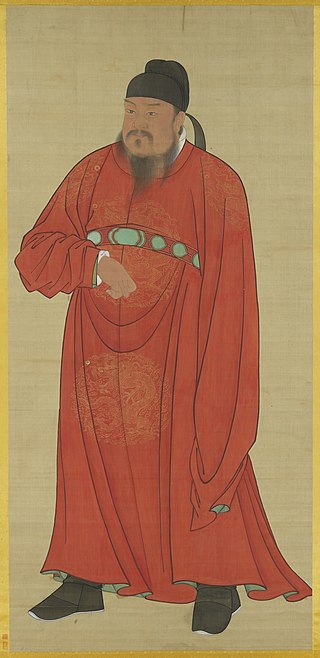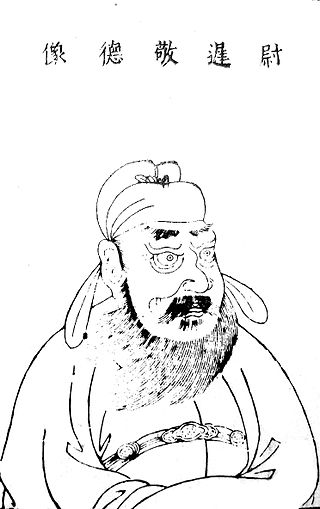
Emperor Taizong of Tang, previously Prince of Qin, personal name Li Shimin, was the second emperor of the Tang dynasty of China, ruling from 626 to 649. He is traditionally regarded as a co-founder of the dynasty for his role in encouraging Li Yuan, his father, to rebel against the Sui dynasty at Jinyang in 617. Taizong subsequently played a pivotal role in defeating several of the dynasty's most dangerous opponents and solidifying its rule over China.

Emperor Gaozu of Tang was the founding emperor of the Tang dynasty of China, reigning from 618 to 626. Under the Sui dynasty, Li Yuan was the governor in the area of modern-day Shanxi, and was based in Taiyuan.

Wei Zheng (580–643), courtesy name Xuancheng, posthumously known as Duke Wenzhen of Zheng, was a Chinese politician and historian. He served as a chancellor of the Tang dynasty for about 13 years during the reign of Emperor Taizong. He was also the lead editor of the official history of the Sui dynasty, the Book of Sui, which was composed in 636.

Zhangsun Wuji, courtesy name Fuji (輔機), formally the Duke of Zhao, was a Chinese politician who served as a chancellor in the early Tang dynasty. He was Empress Zhangsun's brother, which made him a brother-in-law of Emperor Taizong and a maternal uncle of Emperor Gaozong. He was an important advisor to Li Shimin when the latter was still the Prince of Qin during the reign of his father, Emperor Gaozu. He helped Li Shimin overcome his brothers Li Jiancheng and Li Yuanji in a succession struggle at the Xuanwu Gate Incident, eventually enabling Li Shimin to become the heir apparent and later the emperor. He was also instrumental in Emperor Taizong's selection of Li Zhi as the Crown Prince, and was exceedingly powerful after Li Zhi took the throne as Emperor Gaozong. However, he gradually fell out of his nephew's favour by failing to support Emperor Gaozong's decision to depose his first wife, Empress Wang, and replacing her with Empress Wu, especially after the beginning of the new year 657 with the power of Empress Wu fell more. In 659, Zhangsun Wuji was falsely accused of treason by Empress Wu's political ally, Xu Jingzong, and eventually ordered to be sent into exile by Emperor Gaozong. Xu Jingzong subsequently sent the official Yuan Gongyu (袁公瑜) to force Zhangsun Wuji to commit suicide on his way to exile.
Feng Lun, courtesy name Deyi, better known as Feng Deyi, formally Duke Miao of Mi, was a Chinese official of the Sui and Tang dynasties who served as a chancellor during the reigns of Emperor Gaozu of Tang and Emperor Taizong of Tang. He was praised for his quick thinking but criticized by historians for his being overly attentive to the emperors' desires.
Pei Ji (570-629), courtesy name Xuanzhen, formally Duke of Hedong, was an important official and one-time chancellor of the Tang dynasty. He initially served as an official of the Sui dynasty and was one of the driving forces in persuading the general Li Yuan to rebel against Emperor Yang of Sui. He eventually assisted Li Yuan in founding the Tang dynasty as its Emperor Gaozu and was greatly honored in Emperor Gaozu's reign. After Emperor Gaozu's son Emperor Taizong became emperor in 626, Pei began to be accused of corruption and associations with witchcraft and was exiled. Emperor Taizong soon remembered Pei's contributions to Tang's founding and tried to recall him, but Pei died before he could do so.
Empress Zhangsun (長孫皇后, personal name unknown, presumably Wugou, formally Empress Wendeshunsheng or, in short, Empress Wende, was a Chinese essayist and an empress of the Chinese Tang dynasty. She was the wife of Emperor Taizong and the mother of Emperor Gaozong. She was well educated, and her ancestors were of Xianbei ethnicity. Their original surname was Tuoba, later changed to Zhangsun. During her tenure as empress, she served as a loyal assistant and honest advice to her husband, Emperor Taizong.

Qin Qiong, courtesy name Shubao, better known as Qin Shubao, was a Chinese general who lived in the early Tang dynasty of China. Along with Yuchi Gong, he continues to be worshipped in China as a door god. He is also known by his posthumous name Duke Zhuang of Hu.

Yuchi Gong (尉遲恭) or Yuchi Rong (尉遲融), courtesy name Jingde (敬德), also known by his posthumous name Duke Zhongwu of E, was a prominent general who lived in the early Tang dynasty. Yuchi Jingde and another general Qin Shubao are worshipped as door gods in Chinese folk religion.
Li Yuanji (李元吉), formally Prince La of Chao (巢剌王), more commonly known by the title of Prince of Qi (齊王), nickname Sanhu (三胡), was an imperial prince of the Chinese Tang Dynasty. He was a son of the dynasty's founder Emperor Gaozu of Tang, and in the intense rivalry developed between his older brothers Li Jiancheng the Crown Prince and Li Shimin the Prince of Qin, he sided with Li Jiancheng and often advocated drastic actions against Li Shimin, including assassination. In 626, Li Shimin, fearing that Li Jiancheng and Li Yuanji were about to kill him, laid an ambush for them at Xuanwu Gate outside the palace and killed them. Li Shimin then effectively forced Emperor Gaozu to yield the throne to him.

Li Shiji, courtesy name Maogong, posthumously known as Duke Zhenwu of Ying, was a Chinese military general and politician who lived in the early Tang dynasty. His original family name was Xú, but he was later given the family name of the Tang imperial clan, Li, by Emperor Gaozu, the Tang dynasty's founding emperor. Later, during the reign of Emperor Gaozong, Li Shiji was known as Li Ji to avoid naming taboo because the personal name of Emperor Gaozong's predecessor, Emperor Taizong, had the same Chinese character "Shi". Li Shiji is also referred to as Xu Maogong and Xu Ji in the historical novels Shuo Tang and Sui Tang Yanyi.
Yuwen Shiji, courtesy name Renren, formally Duke Zong of Ying, was a Chinese monarch and politician of the Sui and Tang dynasties, serving as a chancellor, as Shizhong (侍中) (625–626) and Zhongshu Ling (中書令) (626–627), during the reigns of Emperors Gaozu and Taizong of Tang. He was previously an imperial prince in the short-lived state of Xu (許), which was ruled by his brother Yuwen Huaji.

Xiao Yu, courtesy name Shiwen, posthumously known as Duke Zhenbian of Song, was an imperial prince of the Western Liang dynasty who later became an official under the Sui and Tang dynasties. He served as a chancellor during the reigns of the emperors Gaozu and Taizong in the early Tang dynasty.

Fang Qiao, courtesy name Xuanling, better known as Fang Xuanling, posthumously known as Duke Wenzhao of Liang, was a Chinese statesman and writer who served as a chancellor under Emperor Taizong in the early Tang dynasty. He was the lead editor of the historical record Book of Jin and one of the most celebrated Tang dynasty chancellors. He and his colleague, Du Ruhui, were often described as role models for chancellors in imperial China.

Du Ruhui (585–630), courtesy name Keming, posthumously known as Duke Cheng of Lai, was a Chinese official who served as a chancellor under Emperor Taizong in the early Tang dynasty. He and his colleague, Fang Xuanling, were often described as role models for chancellors in imperial China.

Gao Jian, courtesy name Shilian, better known as Gao Shilian, formally Duke Wenxian of Shen (申文獻公), was a Chinese politician of the Tang dynasty. He was the uncle of Empress Zhangsun, Emperor Taizong's wife, and a trusted advisor to Emperor Taizong.
Wang Gui (571–639), courtesy name Shujie, posthumously known as Duke Yi of Yongning, was a Chinese official who served as a chancellor during the reign of Emperor Taizong in the Tang dynasty. He had previously served Li Shimin's elder brother, Li Jiancheng, with whom Li Shimin was locked in an intense rivalry during the reign of their father, Emperor Gaozu, but after Li Shimin killed Li Jiancheng and then took the throne, he knew that Wang was faithful to Li Jiancheng and was capable, and therefore retained him, eventually making him chancellor. Wang was known for his honest and blunt criticism of the emperor, and for that was honored by Taizong, who appreciated such criticism.
Du Yan, courtesy name Zhili, posthumously known as Duke Xiang of Anji, was a Chinese official who served as a chancellor during the reign of Emperor Taizong in the Tang dynasty. His more famous nephew, Du Ruhui, was also a chancellor.
Yu Zhining (于志寧) (588–665), courtesy name Zhongmi (仲謐), formally Duke Ding of Yan (燕定公), was a Chinese politician during the Tang dynasty, during the reigns of Emperor Taizong and Emperor Gaozong. He had served on the staff of Emperor Taizong's oldest son and crown prince Li Chengqian and, after Li Chengqian was removed for plotting to overthrow Emperor Taizong in 643, received approval for having tried to correct Li Chengqian in his ways. Emperor Taizong promoted him, and he subsequently played prominent roles in the imperial government late in Emperor Taizong's reign and early in Emperor Gaozong's reign. In 659, however, because he had previously not supported the ascension of Emperor Gaozong's second wife Empress Wu, he was removed from his office based on accusations by her ally Xu Jingzong that he had conspired with Emperor Gaozong's uncle Zhangsun Wuji, who had opposed Empress Wu's ascension.

Yao Silian, courtesy name Jianzhi (簡之), formally Baron Kang of Fengcheng (豐成康男), was a Chinese historian and politician during the Sui Dynasty and Tang Dynasty and was the lead author of the Book of Liang and Book of Chen, the official histories of the Liang Dynasty and the Chen Dynasty, which his father Yao Cha (姚察), a Chen official, had begun but did not finish.